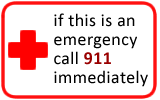Neck Pain
Neck Pain
Does this describe your symptoms? |
Definition
Common Causes
|
If not, see these topics
|
When to Call Your Doctor |
Call 911 Now (you may need an ambulance) If |
|
|
|
Call Your Doctor Now (night or day) If |
|
|
|
Call Your Doctor Within 24 Hours (between 9 am and 4 pm) If |
|
|
|
Call Your Doctor During Weekday Office Hours If |
|
|
|
Self Care at Home If |
|
|
HOME CARE ADVICE FOR MILD NECK PAIN |
Reassurance: Prolonged turning of the head or working in an awkward position can cause muscle pain in the back of the neck. With treatment, the pain usually resolves in 1 to 2 weeks.
Local Cold Or Heat: During the first 2 days after a mild injury, apply a cold pack or an ice bag (wrapped in a towel) for 20 minutes four times a day. After 2 days, apply a heating pad or hot water bottle to the most painful area for 20 minutes whenever the pain flares up. Wrap hot water bottles or heating pads in a towel to avoid burns.
Sleep: Sleep on your back or side, not the abdomen. Sleep with a neck collar - use a foam neck collar (from a pharmacy) OR a small towel wrapped around the neck (Reason: keep the head from moving too much during sleep).
Stretching Exercises:
After 48 hours of protecting the neck, begin gentle stretching exercises.
Improve the tone of the neck muscles with 2 or 3 minutes of gentle stretching exercises per day such as touching the chin to each shoulder, touching the ear to each shoulder, and moving the head forward and backward.
Don't apply any resistance during these stretching exercises.
Pain Medicines:
For pain relief, take acetaminophen, ibuprofen, or naproxen.
Acetaminophen (e.g., Tylenol):
Take 650 mg by mouth every 4-6 hours. Each Regular Strength Tylenol pill has 325 mg of acetaminophen.
Another choice is to take 1,000 mg every 8 hours. Each Extra Strength Tylenol pill has 500 mg of acetaminophen.
The most you should take each day is 3,000 mg.
Ibuprofen (e.g., Motrin, Advil):
Take 400 mg by mouth every 6 hours.
Another choice is to take 600 mg by mouth every 8 hours.
Use the lowest amount that makes your pain feel better.
Naproxen (e.g., Aleve):
Take 250-500 mg by mouth every 12 hours.
Use the lowest amount that makes your pain feel better.
Extra Notes:
Acetaminophen is thought to be safer than ibuprofen or naproxen in people over 65 years old. Acetaminophen is in many OTC and prescription medicines. It might be in more than one medicine that you are taking. You need to be careful and not take an overdose. An acetaminophen overdose can hurt the liver.
Caution: Do not take acetaminophen if you have liver disease.
Caution: Do not take ibuprofen or naproxen if you have stomach problems, kidney disease, are pregnant, or have been told by your doctor to avoid this type of medicine. Do not take ibuprofen or naproxen for more than 7 days without consulting your doctor.
Before taking any medicine, read all the instructions on the package
Good Body Mechanics:
Lifting: Stand close to the object to be lifted. Keep your back straight and lift by bending your legs. Ask for help if needed.
Sleeping: Sleep on a firm mattress.
Sitting: Avoid sitting for long periods of time without a break. Avoid slouching. Place a pillow or towel behind your lower back for support.
Computer screen: place at eye level.
Posture: Maintain good posture.
Avoid: Avoid triggers that overstress the neck such as working with the neck turned or bent backward, carrying heavy objects on the head, carrying heavy objects with one arm (instead of both arms), standing on the head, contact sports or even friendly wrestling.
Call Your Doctor If:
Numbness or weakness occurs
Bowel or bladder problems occur
Pain persists for more than 2 weeks
You become worse
And remember, contact your doctor if you develop any of the "Call Your Doctor" symptoms.
Updated:
March 22, 2017



